Gaugamela (331 BCE)
Q179670Battle of Gaugamela (October 1, 331 BCE): decisive battle in the war between Macedonia and the Achaemenid Empire, fought in northern Iraq. The outcome was influenced by a celestial omen that announced the imminent downfall of the Persian king Darius III Codomannus and the succession by Alexander the Great.
Delay
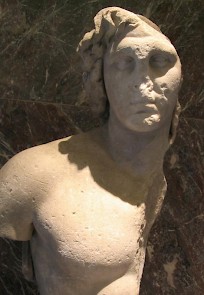
In the summer of 331, Darius learned that Alexander was returning from Egypt. Alexander soon reached Tyre, where he made a sacrifice to Melqart and organised sporting contests and a theatre festival. Now that Alexander controlled the wealth of such cities as Sardes, Damascus, and Memphis, he was in a position to pay huge fees, buying up actors who were still under contract in Greece. Other guests from Greece included envoys petitioning for the release of soldiers captured at Granicus. King Agis III of Sparta had started his war of Greek liberation and had already scored one victory over a Macedonian contingent, even though he did not yet have the support of all the Greek cities. So Alexander complied with the envoys' request, with the result that in Athens, for example, enough sympathy was aroused for the Macedonian cause to dissuade people from casting in their lot with the Spartans. At the same time, Alexander sent hundreds of Phoenician and Cypriot ships to Crete and the Peloponnese to do battle with Agis.
Alexander was biding his time. He expected Darius to attack him, but that would have been uncharacteristically foolish. Darius preferred to let Alexander set out for the east, unfamiliar territory for the Macedonians. The son of Zeus had another reason for restraint. He was expecting fifteen thousand fresh troops to follow from Europe, troops that consistently failed to arrive, perhaps because Antipater needed them in the struggle against Agis. Eventually Alexander decided to set out for Mesopotamia, in the hope that reinforcements would catch up with him before he ran into Darius' army.
Opening game
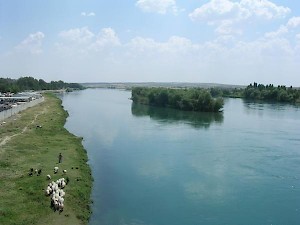
Darius put not the slightest obstacle in Alexander’s way. Seventy years earlier, a Yaunâ army, led by the rebel Persian Prince Cyrus the Younger, had been defeated in Babylonia and largely destroyed on its way home. The Persian high command had reason to be optimistic and they allowed the Macedonians to advance towards the Euphrates, to a place the sources call Thapsacus, which must lie somewhere in the borderlands between Turkey and Syria. Alexander's friend Hephaestion had already started building two pontoon bridges when Mazaeus, the satrap of Babylonia, appeared with a small army on the east bank.
At first the Macedonians did not finish building their bridge all the way to the opposite bank, because they feared Mazaeus' troops would attack their bridgehead. But when Mazaeus heard that Alexander was on his way, he and his entire army fled. As soon as he had gone, the bridges were extended to the far bank and Alexander crossed them with his army.note
Arrian's claim that Mazaeus fled as the Macedonian king approached is directly or indirectly based on words used by Alexander, Parmenion and other commanders to explain events to their own soldiers. It must surely have encouraged the men to know that the first contact with the enemy in this operation had brought such easy success.
But the Macedonian general staff knew better. In fact, few manoeuvres by Persian commanders were as successful as that of Mazaeus. Alexander had been planning to march along the Euphrates to Babylon, where he suspected he would find Darius' new army. The boats used to support the bridges had been intended as transport for heavy equipment. The river route was the shortest and it was also known to the Macedonian generals from Xenophon's Anabasis, an account of the expedition by Cyrus the Younger mentioned above. It was now obvious that Darius had blocked that route. The harvest was already in and all along the Euphrates the grain was stored in well-fortified settlements that would be easy for Mazaeus to defend. His presence meant that the Macedonians would have to engage in siege warfare to feed themselves. They would face hunger. The only alternative route was the Persian Royal Road, which Alexander knew lay somewhere to the unknown east.
Macedonian detour, Persian preparations
It was impossible to march directly south-eastwards through the desert, since high summer had arrived and the average daytime temperature was close to 50°C. An ancient map describes the region as "desolate plains, made uninhabitable by a lack of water". The Macedonians would have to march around the desert, across the less arid steppe to the north.
When Darius learned that Alexander had decided to make this detour and was marching towards the Tigris, he left Babylon and headed north to offer battle in the central region of what had once been the kingdom of Assyria. He knew his enemy would arrive there sooner or later and he looked for a broad battleground where his numerical superiority could be used to full advantage, which had not been the case at Issus. He set up his command centre at Arba'il (present-day Irbil), a stronghold on raised ground that was famous as the holy site of the fertility goddess Ištar. To judge by its name, which means "city of four gods", it was home to the holy sites of a number of other cults as well. This was an excellent base. Here the Royal Road joined the roads to Armenia and the eastern satrapies, so it was a convenient spot to assemble a large army. The battlefield Darius had chosen lay seventy-five kilometres to the northwest, below a hill in the form of a dromedary's hump, which had given it the name derived from the Semitic word for that animal, gammalu. The Macedonians referred to these places as Arbela and Gaugamela.
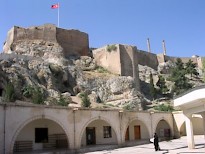
Once the Persians had levelled the terrain to make it suitable for war chariots and horsemen, they had to ensure that Alexander would not march off somewhere else. Darius let his adversary reach Mesopotamia unhindered. The region reminded the Macedonians of their fatherland. When they came to Urhai, a city on a rock rising high above the plain, where water supplies were plentiful, they renamed it Edessa after a Macedonian city of a similar altitude that was famous for its waterfall. Alexander allowed his men to rest for a few days in nearby Harran and, being a religious man, is likely to have performed a sacrifice in the temple of the moon god Sin. Moving on through the forests of Nisibis, the Macedonians reached the Tigris on 18 September 331, somewhere close to what is now the Eski Mosul dam.
Their situation was problematic. Mazaeus' army, which had joined forces with Darius at Arbela, had been sent on ahead to lay waste to the land the Macedonians would have to pass through. They found too little food to feed themselves properly, but not so little that they were forced to turn back. All around them, Mazaeus' Babylonian horsemen set fire to the thatched roofs of houses, to sheaves of wheat, to crops and food stores:
The entire area to the east of the Tigris was still smoking from recent fires, since Mazaeus had put the fields to the torch as if he himself were the invading enemy. Because the daylight was subdued by dark clouds of smoke, Alexander held back for fear of a trap, but when his scouts told him the coast was clear, he sent horsemen ahead of him to test whether the river was fordable.note
Crossing the Tigris
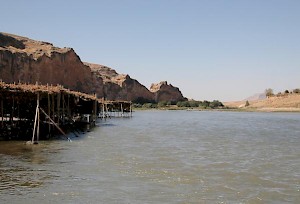
The Persians guarding the ford pulled back after a brief skirmish and the Macedonians reached the opposite bank without significant difficulty. They were now in Assyria. Even though this once powerful kingdom had been ruled for the past three centuries by the Babylonians, whose empire in turn had been absorbed into that of the Persians, the name "Assyria" still spoke to the imagination. The fall of such a once-powerful city as Nineveh had made an impact even in Europe.
We know from the contemporary Astronomical Diaries that panic broke out in the Persian army that evening and it is natural to assume this was in response to the news that the enemy had crossed the river. But in fact there was no reason for panic. Alexander had done exactly what Darius had wanted him to do. By leaving the fordable stretches of the Euphrates and the Tigris practically unguarded, the Persians had managed to guide the enemy to the battlefield of their choice. Darius was completely in command of the situation and seemed guaranteed of victory.
Evil omens
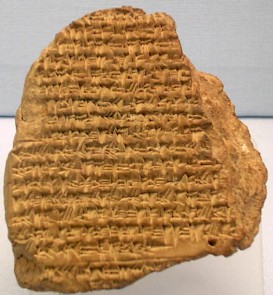
It was not to be. On 20 September, immediately after sunset, Darius’ soldiers watched the moon turn blood red and then go dark. The Astronomical Diaries describe the omen:
On the thirteenth day of the month of Ulûlu in the fifth year of Darius there was an eclipse of the moon, which was entirely darkened as Jupiter set. Saturn was four fingers distant. As the eclipse became total, a westerly wind was blowing; as the moon became visible again, an easterly wind. During the eclipse there were deaths and plagues.
According to the Persian Magians, an eclipse of the moon was more significant for the king himself than most other omens.note The Babylonian Chaldaeans, in their catalogue of prophecies, offered an even less propitious interpretation:
If the moon or the sun are eclipsed and Jupiter is not visible: end of a dominion.note
Moreover, according to the systems generally used in prophetic writings, an eclipse on the thirteenth day of the month meant disaster for Babylonia and an eclipse in the month of Ulûlu meant disaster for Persia. A westerly wind during such an eclipse indicated that the catastrophe was to come from that direction; an easterly wind as the disc of the moon became visible meant the eastern regions were safe. The fact that Saturn was visible gave added force to all these prophecies.
In other words, after the omens of 20 September, a Babylonian astronomer would have known that the end was near for the ruler of Persia and Babylonia and that the cause of his demise would be an enemy from the west. Although the east would provide sanctuary, this was still a demoralising prospect. On another clay tablet we find a similar description of a lunar eclipse, but this time it predicts the fate of the victor rather than the defeated party:
If on the thirteenth or fourteenth of Ulûlu the moon is eclipsed, the watch passes and the darkness remains, the moon’s features are dark as lapis lazuli, the moon is eclipsed as far as its centre and its western quadrant covered, a westerly wind is blowing, the sky remains dark and the light concealed, then the king’s son will undergo a cleansing ritual in front of the throne, but he will not ascend to the throne. An invader will mount an invasion supported by the rulers of the west; for eight years he will exercise kingship [lacuna]; he will defeat a hostile army; he will find abundance and riches on his path; he will pursue his enemy relentlessly and there will be no end to his good fortune.note
Astrology was not a secret doctrine.note We can assume that educated Babylonians in Darius' army, such as Mazaeus, would have known the fate of their king was sealed. Morale declined visibly, especially when the following day brought word that the Macedonians had made short work of the cavalry unit responsible for laying waste to the land through which Alexander was marching. The Astronomical Diaries record a new omen in the early hours of 23 September:
A meteor flashed. Its light was visible on the ground.note
When daylight came, one of the Persian courtiers taken prisoner during the battle of Issus arrived at Darius' camp, released in order to bring the great king more bad tidings: his wife Stateira, who had been take captive, had died in childbirth two days before. Alexander had buried her in accordance with Persian rites.
The Macedonians advance
On the twenty-fourth, Darius sent a messenger to the Macedonian army with a third peace proposal. This time he offered his enemy all the land to the west of the Euphrates and the hand in marriage of one of his daughters who had been captured by Alexander. This proposal shows that the Persian king was keen to avert a battle. His army had been so heavily demoralised by bad omens that he felt forced to make concessions. It was no use. The messenger returned the following day to report that Alexander had rejected his offer.
He also reported that the Macedonians were only forty kilometres away from the Persians that morning and advancing rapidly. In the evening another omen was seen; the Astronomical Diaries refer to it as a "fall of fire". Exactly what this means is unclear, but it may have been a bolide, a kind of slow meteorite. The phenomenon was seen by the Macedonians as well and it provoked panic. Mazaeus, who had taken up position on a hill between the Macedonian and Persian camps, could see that the enemy was not breaking camp that morning, in fact the Macedonians were starting to reinforce their position with a palisade. Alexander had never approached an enemy so circumspectly. More than ten kilometres separated the two armies.
On the evening of the twenty-sixth there was another fall of fire and Mazaeus informed his king that the Macedonian army remained in its camp. The enemy did not turn out on 27 or 28 September either. No doubt the soldiers made use of the time to sharpen their weapons and to exercise. On the evening of the twenty-ninth Mazaeus saw that the enemy army was on the move and he knew it was time to abandon the hill and join the Persian main force.
A remarkable omission in the sources shows just how great the tension had become. The Macedonian army had to cross a river and pass along a canal that the Assyrian king Sennacherib had laid long before, as a means of supplying Nineveh with clean water. It was one of the greatest engineering achievements of the Ancient World, but it passed unnoticed. At least, the Greek sources, which generally make note of such things, do not refer to it. Neither is there any mention of the nearby ruins of an Assyrian palace.
Preparing for battle
When the sun rose on 30 September, Darius sent scouts to the far side of the field to study his opponents' battle formation. It looked similar to their formation at Issus. In the Macedonian centre was the phalanx (under the leadership of Craterus) and on the right wing stood the shield-bearer infantrymen (under the command of Parmenion's son Nicanor), the companion cavalry (led by Nicanor's brother Philotas and Alexander) and the light cavalry. On the left wing, commanded as ever by Parmenion, stood the Thessalian and Thracian horsemen, commanded as ever by Parmenion. A second line, invisible to the Persians, consisted of Greek troops and lightly armed soldiers who were to intervene if the Persians attempted a flanking movement.
Alexander and his general staff were also studying the enemy lines, stretched out six kilometres wide in front of them. Arrianus records what they saw:
At the centre, where King Darius was to be found, the relatives of the king were arranged, along with the Persian Applebearers, the Indians, the "Carian deportees" and the Mardian archers; behind them, in a hollow, were the Babylonians [under the leadership of Mazaeus], the Red Sea contingents and the Sittacenians. Out in front on the left wing, opposite Alexander's right wing, stood the Sacaean horsemen [commanded by Bessus], around 1,000 Bactrians, and 100 scythed chariots. The elephants and 50 scythed chariots stood close to Darius' own royal squadron. At the front of the right wing stood the Armenian and Cappadocian horsemen, with another 50 scythed chariots. The Greek mercenaries were placed on either side of Darius and his Persian followers, directly opposite the Macedonian phalanx, since only they could possibly be a match for the phalanx.note
Scythed chariots were war chariots with, as the name suggests, scythes attached to the wheels. Like the elephants, they were deployed mainly against enemy infantry.
Night
It was an almost moonless night, but not dark, since hundreds of campfires were burning on either side of the plain. Darius did not want a repeat of the battle of Granicus, where the Macedonians had taken advantage of the fact that Persian armies were only allowed to march after performing sacrifices to the rising sun. So he had his men stay awake all night, in battle formation.
Accompanied by generals and relatives he made the rounds of his troops […]. He invoked the sun, Mithra, and the holy eternal fire, to lend the kind of courage to his men that would be appropriate to the ancient fame and memory of their ancestors. "If the human spirit is capable of understanding the signs of divine assistance," Darius went on, "then the gods are definitely with us. We caused panic recently among the Macedonians and our enemies are still stiff with fear, throwing down their weapons. The tutelary deities of the Persian Empire will give those madmen everything they deserve. And their leader has not acquired a single grain of wisdom! Like a wild animal, he sees nothing but the prey he is after as he storms into the trap set for that very same prey."note
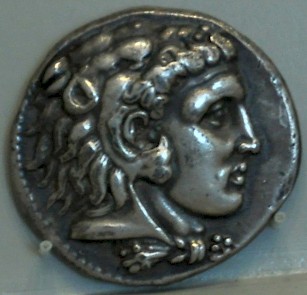
So runs the account of Curtius Rufus, which may be an accurate reflection of the great kings words. The night of 30 September 331 was the beginning of autumn, when the Persians celebrated Mithrakana – sure enough, by making sacrifices to the sun, to Mithra and to the holy fire. The comparison between Alexander and a "wild animal" is also worth noting. In the Persian holy book, the Avesta, the same imagery is used to describe Angra Mainyu, the evil counterpart of Ahuramazda. The personification of evil, he was sometimes described as like a lion, and the Persian king was often depicted fighting a lion. Alexander liked to have an image of himself as Heracles stamped on coins, with a lion's skin over his head. It was natural for Darius, Ahuramazda’s chosen ruler, to compare his enemy to Angra Mainyu.
The battle of Gaugamela
Our detailed knowledge of events leading up to the battle is mirrored by a lack of information about the engagement itself. We simply have no idea what happened, even though Greek and Roman authors offer detailed descriptions of the advances and manoeuvres that took place on 1 October 331. Their reports amount to saying that Alexander charged at Darius with such energy and terrifying ferocity that he panicked, turned around and thereby put the mass of the Persian army to flight.
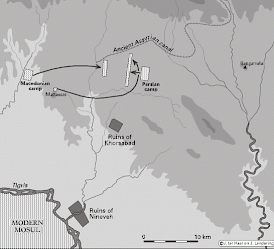
The actual course of events was probably rather different. The battleground at Gaugamela was a sandy plain, and the sand they kicked up would have made it impossible for the Macedonians and Persians to see what was happening. After a day of fighting in a dust storm, Alexander's army emerged in control of the field. No one could say how this had come about, although the Macedonians naturally assumed that their plan of attack had proved successful: an advance by the companion cavalry on the right wing, led by Alexander, while Parmenion's left wing and the second line took up defensive positions. There is also firm evidence that at some point Mazaeus' Babylonian horsemen broke through the Macedonian lines, only to take the Macedonian camp instead of attacking the enemy from the rear.
That evening the victors tried to reconstruct what had happened. They put their victory down to the heroic performance of their young king and to Darius' cowardice. What actually happened lies concealed for ever in the dust clouds of the battlefield, but the Astronomical Diaries do offer some interesting information:
On the morning of the twenty-fourth of the month of Ulûlu, the king of the world [Alexander] raised his standard [lacuna]. The armies engaged each other and the king’s soldiers suffered a heavy defeat. The troops abandoned their king [Darius] and headed back to their cities. They fled to the lands in the east.note
"King of the world" is how the Babylonians translated "king of Asia", the title accepted by Alexander. The writer of the Astronomical Diaries had to use this ancient royal title because "Asia" was not a concept he recognised. The striking thing about this fragment is that it says Darius was abandoned by his men and not - as Macedonian propaganda would have it - that he let his men down. By "lands in the east" the writer means Media, where Darius, just as the Chaldaeans had predicted, found sanctuary and could begin raising his third army.
The Babylonian account of the engagement, which was written a few days after the battle, makes sense in the light of what had happened in the days leading up to it. Despite Darius' meticulous preparations and the fact that his enemy behaved like a puppet in his hands, his soldiers, many of whom had no combat experience at all, were demoralised and ran away. It is only a slight exaggeration to say that the battle of Gaugamela amounted to an attack on a large group of deserters. It wasn't Alexander's courage or Darius' cowardice that decided the fate of the Persian Empire, it was the signs that were seen in the sky.
Thanks
This was about half a chapter from my book Alexander de Grote. De ondergang van het Perzische rijk ("Alexander the Great. The Demise of the Persian Empire"), which was published in 2004 by Athenaeum - Polak & Van Gennep, Amsterdam. It was translated for the NLPVF (Foundation for the Production and Translation of Dutch Literature) by Liz Waters, who kindly gave permission to reproduce the text on this website.